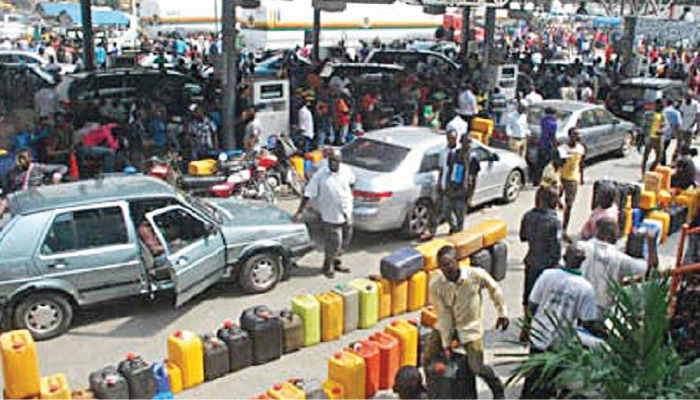The cost of Premium Motor Spirit (PMS), commonly known as petrol, may soon exceed N1,000 per litre at filling stations as prices at private depots have surged to between N920 and N950 per litre. This development has sparked fears of an imminent increase in pump prices.
Amid the growing concerns, protesters took to the streets of Abuja on Monday, demanding the removal of the Group Managing Director of the Nigerian National Petroleum Corporation Limited (NNPCL), Mele Kyari, due to the ongoing fuel shortages. Reports indicate that NNPCL has warned oil marketers of the financial difficulties it faces in continuing petrol imports, leading to apprehensions about a potential halt in the company’s importation activities.
NNPCL’s spokesperson, Olufemi Soneye, acknowledged the company’s financial challenges, which have raised alarms about the sustainability of the nation’s fuel supply. NNPC, as Nigeria’s sole importer of petrol, has been grappling with subsidies amounting to trillions of naira, further straining its resources.
“NNPC Ltd is under significant financial pressure due to the high costs of PMS supply, which threatens the sustainability of fuel availability,” Soneye stated on Sunday.
Petrol marketers have expressed concerns that the financial strain on NNPCL could lead to a further hike in pump prices. Ukadike Chinedu, National Publicity Secretary of the Independent Petroleum Marketers Association of Nigeria (IPMAN), indicated that NNPC Trading, the sole importer of petrol, has informed marketers of the unsustainable nature of the current situation, hinting at possible price increases.
The situation has been exacerbated by private depots selling petrol at prices ranging from N920 to N950 per litre, in contrast to the regulated price expectations set by the Nigerian Upstream and Downstream Petroleum Regulatory Authority (NMDPRA). The NMDPRA has vowed to take action against filling stations selling petrol at inflated prices, yet independent marketers argue that they are forced to sell at higher rates due to the elevated costs at private depots.
In response to the rising prices and prolonged fuel scarcity, protesters in Abuja have called for Kyari’s dismissal, accusing him of mismanaging the nation’s fuel supply. Meanwhile, human rights lawyer Femi Falana has urged the government to expose what he describes as the “monumental fraud” in Nigeria’s fuel importation process, particularly questioning the NNPCL’s claims about fuel smuggling.
The Trade Union Congress (TUC) and major opposition parties have also warned that any further increases in petrol prices could trigger widespread protests, given the already dire economic conditions in the country. Long fuel queues and inflated prices persist across various states, with independent marketers selling petrol for as much as N1,300 per litre in some areas.
Civil society groups have criticized the government’s handling of the fuel crisis, urging accountability and transparency from both the NNPC and the federal government. The situation remains tense, with Nigerians bracing for further economic hardship as fuel prices continue to rise.
